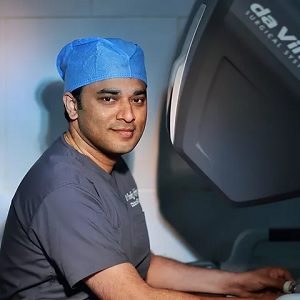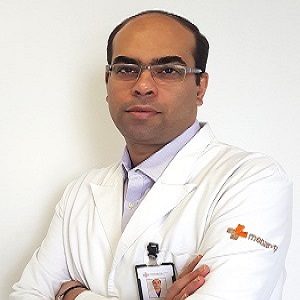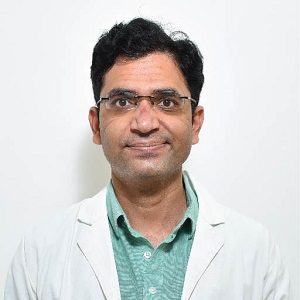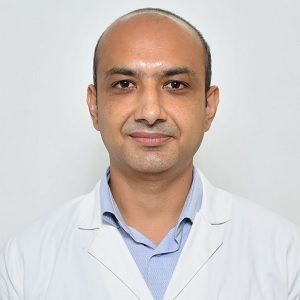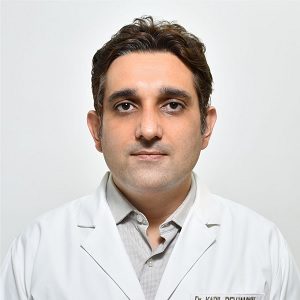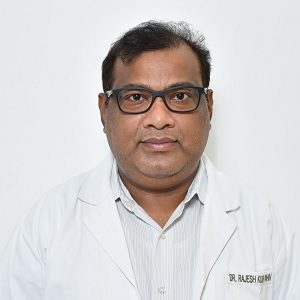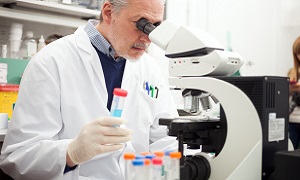Best Doctors in India for Liver Cirrhosis treatment
- Liver Transplant Surgeon and HPB Surgeon, Chennai, India
- Over 15 years’ experience
Profile Highlights:
- Dr. Selvakumar Naganathan is one of the best liver transplant surgeons in India with nearly 15 years of experience.
- He has carried out more than 2000 procedures, including 300 donor & 500 recipient hepatectomies, cadaver transplantations, retrieval of cadaver livers, and live donor liver transplants.
- He also established many liver transplantation centers across India & other countries.
- General Surgeon and Surgical Gastroenterologist, Chennai, India
- Over 27 years’ experience
Profile Highlights:
- Dr. Raghunath K J is a well-known name in the field of general surgery with an experience of more than 27 years.
- He went under training in advanced Laparoscopic surgery from Canada and France.
- Dr. Raghunath pioneers many prestigious projects in the UK.
- Dr. Raghunath has a specialized interest in Gall Bladder Stone treatment, Hernia, GI Cancer Surgery, Laparoscopic Sleeve Resection, Endoscopic Surgery, etc.
- Colorectal Surgeon and Robotic Surgeon, Chennai, India
- Over 26 years’ experience
Profile Highlights:
- Dr. Venkatesh Munikrishnan is one of the best Gastroenterologists and Colorectal Surgeons in Chennai, having 21 years of experience in managing disorders that need surgical treatment.
- Dr. Munikrishnan specializes in surgical oncology, endoscopy, Gastritis Treatment, etc.
- He is also active in research; one of his research on CT Colonography fetched a grant from Bracco, Milan, Italy.
- GI Surgeon and Liver Transplant Surgeon, Gurugram, India
- Over 20 years’ experience
Profile Highlights:
- Dr. Amit Nath Rastogi is a pioneer in the field of liver transplant surgery. He completed his fellowship in liver transplant surgery at Sir Gangaram hospital while being a part of the largest liver transplant program in the country.
- Furthermore, he received his training in robotic liver surgery from IRCAD -Strasbourg, France, and advanced robotic HPB training from Grosseto.
- Liver Transplant Surgeon, Gurugram, India
- Over 10 years’ experience
Profile Highlights:
- Dr. Prashant Vilas Bhangui is one of the highly trained liver transplant specialists who received his training in Surgical Gastroenterology and Liver Transplantation.
- He also holds a European Inter-University Diploma in Hepato-Biliary-Pancreatic Cancers.
- Dr. Prashant is further interested to work in certain fields which include hepatocellular carcinoma, colorectal liver metastases, and living donor liver transplantation. Besides this, he has also published several journals on these subjects.
- Gastroenterologist, Gurugram, India
- Over 7 years’ experience
Profile Highlights:
- Dr. Abhinandan Mishra is one of the young Gastroenterology doctors in Gurugram who is particularly interested in inflammatory bowel disease treatment.
- Dr. Abhinandan Mishra offers Endoscopic Retrograde Cholangiopancreatography, Ascites tap, Endoscopy, Peroral Endoscopic Myotomy, Capsule Endoscopy, Esophageal Manometry, Magnetic Resonance Cholangiopancreatography, etc.
- Gastroenterologist, Gurugram, India
- Over 18 years’ experience
Profile Highlights:
- Dr. Atul Sharma is a renowned Gastroenterology practitioner in Gurugram and is particularly interested in Third Space Endoscopy and Per Oral Endoscopic Myotomy (POEM).
- He presented several papers on Manometry, Luminal gastroenterology, and interventional Gastroenterology during training in Advanced Interventional GI Endoscopy.
- Gastroenterologist, Gurugram, India
- Over 15 years’ experience
Profile Highlights:
- Dr. Kapil Jamwal is a renowned GI practitioner in Gurugram with an extensive experience in digestive and liver disease.
- The specialist offers treatment for Hepatitis B, Jaundice, Hepatitis C, Inflammatory Bowel Syndrome, Acute Pancreatitis, Liver Diseases, and Irritable Bowel Syndrome.
- Gastroenterologist, Gurugram, India
- Over 18 years’ experience
Profile Highlights:
- Dr. Rajesh Padhan is a renowned Gastroenterologist in Gurugram with an extensive experience of more than 18 years in the field.
- He is skilled in carrying out various endoscopy procedures such as Colonoscopy, Endoscopic retrograde cholangiopancreatography, Endoscopic ultrasound, upper GI endoscopy, etc.
- Gastroenterologist, Hepatologist, Gurugram, India
- Over 25 years’ experience
Profile Highlights:
- Dr. Sakshi Karkra is one of the best Pediatric gastroenterologists in Gurugram.
- She has special interest/ expertise in Colonoscopy, Upper GI Endoscopy, Capsule endoscopy, Enteroscopy, Endoscopic variceal ligation, Foreign body removal, Stricture & achalasia dilatation, Polypectomy, Anal manometry, Liver Biopsy, and Colonic manometry.
Best Hospitals in India for Liver Cirrhosis treatment
Cirrhosis
Cirrhosis is a late stage of the fibrosis or scarring of the liver. Many liver diseases or conditions like chronic alcoholism or hepatitis result in cirrhosis. Whenever any disease or excess consumption of alcohol damages your liver, it tries to undergo repair. The scar tissue forms during this process. With the advancement of cirrhosis, more scar tissue develops so that the liver functioning becomes difficult. This condition is decompensated cirrhosis. Advanced cirrhosis may turn out to be life-threatening.
Causes of Cirrhosis
A wide range of conditions and diseases cause cirrhosis by damaging the liver. Some of the causes enumerated are:
- Hemochromatosis or iron buildup in the body
- Alpha-1 antitrypsin deficiency
- Chronic alcohol abuse
- Inherited sugar metabolism disorders like glycogen storage disease or galactosemia
- Nonalcoholic fatty liver disease accumulates fat in the liver
- Chronic viral hepatitis like hepatitis B, C, and D
- Cystic fibrosis
- Biliary atresia in which there is a poor formation of bile ducts
- Infections like brucellosis or syphilis
- Primary biliary cirrhosis or destruction of the bile ducts
- Alagille syndrome that is a genetic digestive disorder
- Primary sclerosing cholangitis in which there is scarring and hardening of the bile ducts
- Autoimmune hepatitis where the body’s immune system causes liver disease.
- Medications like isoniazid and methotrexate
Symptoms of Cirrhosis
Cirrhosis does not show signs or symptoms until extensive liver damage. The signs include:
- Yellow discoloration in the eyes and the skin
- Swelling called edema in the legs, ankles, and feet
- Easy bruising and bleeding
- Spiderlike blood vessels on your skin
- Nausea
- Fatigue
- Itchy skin
- Redness in the palms of the hands
- Loss of appetite
- Weight loss
- Absence of menstrual cycle in women, not related to menopause
- Gynecomastia (breast enlargement) or testicular atrophy in men
- Fluid accumulation in the abdomen called ascites
- Drowsiness, confusion & slurred speech
Diagnosis of Cirrhosis
People don’t experience any symptoms in the early stages of liver cirrhosis. Most commonly, doctors detect liver cirrhosis through checkup or routine blood tests. They carry out a combination of imaging tests and laboratory tests to confirm the diagnosis.
Imaging Tests

Laboratory Tests
Your doctor may recommend some blood tests to you to check for the signs of malfunctioning in the liver like excess bilirubin. He or she may also check for specific enzymes indicating liver damage. The doctor will also check for creatinine in your blood as it helps to assess kidney function. You might also need to undergo screening for the hepatitis virus.
The doctor may also check your International Normalized Ratio (INR) to test the clotting ability of your blood. The blood test results will help your doctor to diagnose the underlying causes of cirrhosis of the liver. It also reveals the severity of the cirrhosis of the liver.
Biopsy
If you have cirrhosis, your doctor will recommend biopsy. Although a tissue sample or biopsy is not necessary to form a diagnosis, your doctor may use it for identifying the cause, extent & severity of the liver damage in your body and plan the treatment accordingly.
Your doctor would recommend regular diagnostic tests to monitor the signs of the disease as it advances and to identify the complications, like liver cancer & esophageal varices. These days, non-invasive tests are widely available to the doctor for the purpose of monitoring.
Treatment Options for Cirrhosis
The cause and extent of damage to the liver by the disease is a key component in deciding the treatment for liver cirrhosis. The primary aim of the treatment is to slow down the advancement of the scar tissue in the liver and to either prevent or treat the symptoms & complications of the liver cirrhosis. Serious liver damage may require you to hospitalize.
It is possible to minimize the damage to the liver in early cirrhosis if your doctor treats the underlying cause.
Treatment for alcoholism
Weight loss
Medications
Medications for other causes
Treatment options for the complications
Excess fluid in the body
Portal hypertension
Infections
Hepatic encephalopathy
Increased cancer risk
Liver transplant surgery
When the liver fails to function in advanced cases, your doctor will recommend a liver transplant surgery. It replaces your liver with a healthy one from a deceased donor.



